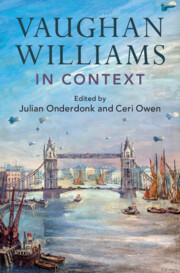Book contents
- Vaughan Williams in Context
- Composers in Context
- Vaughan Williams in Context
- Copyright page
- Dedication
- Contents
- Illustrations
- Graphs and Tables
- Musical Examples
- Notes on Contributors
- Acknowledgements
- Editorial Note
- Bibliographic Abbreviations
- Introduction
- Part I Biography, People, Places
- Part II Inspiration and Expression
- Chapter 7 Early Development
- Chapter 8 Romanticism
- Chapter 9 Amateur Music and Musicians
- Chapter 10 Performance
- Chapter 11 Modalities of Landscape
- Part III Culture and Society
- Part IV Arts
- Part V Institutions
- Part VI Reception
- Further Reading
- Index of Works
- General Index
Chapter 7 - Early Development
from Part II - Inspiration and Expression
Published online by Cambridge University Press: 28 March 2024
- Vaughan Williams in Context
- Composers in Context
- Vaughan Williams in Context
- Copyright page
- Dedication
- Contents
- Illustrations
- Graphs and Tables
- Musical Examples
- Notes on Contributors
- Acknowledgements
- Editorial Note
- Bibliographic Abbreviations
- Introduction
- Part I Biography, People, Places
- Part II Inspiration and Expression
- Chapter 7 Early Development
- Chapter 8 Romanticism
- Chapter 9 Amateur Music and Musicians
- Chapter 10 Performance
- Chapter 11 Modalities of Landscape
- Part III Culture and Society
- Part IV Arts
- Part V Institutions
- Part VI Reception
- Further Reading
- Index of Works
- General Index
Summary
Vaughan Williams was an eclectic composer and he required a period of twenty years to find his individual voice. Much emphasis has, in the past, been placed on the ‘breakthrough’ of folk song and on the composer’s supposed admittance of technical inferiority during this lengthy period of stylistic discovery. It is argued here, however, that this supposed affliction was due as much to a public-school self-modesty and that, in truth, he was no less advanced than his major peers. Moreover, this chapter attempts to accentuate the importance of his compositional ‘training’, under Parry, Charles Wood, Alan Gray, Stanford, Max Bruch, and Ravel, and, more particularly, the numerous continental and home-grown influences (notably Wagner and Parry), over and above the revelation of folk song in 1903, which played a dominant role in shaping his later style.
Keywords
- Type
- Chapter
- Information
- Vaughan Williams in Context , pp. 61 - 69Publisher: Cambridge University PressPrint publication year: 2024



